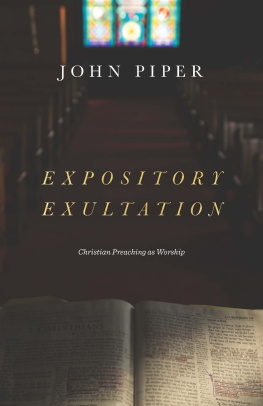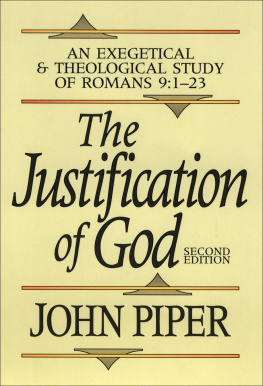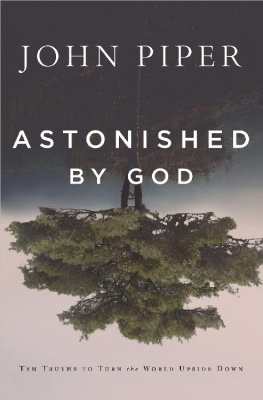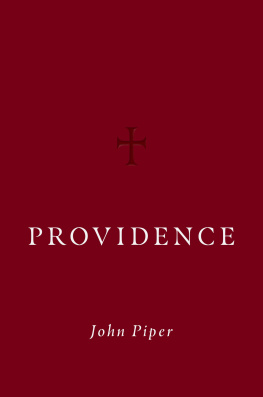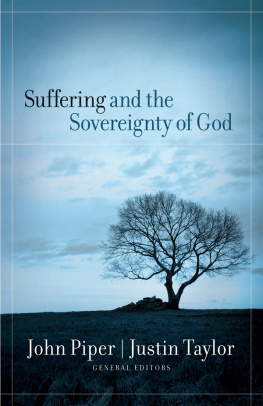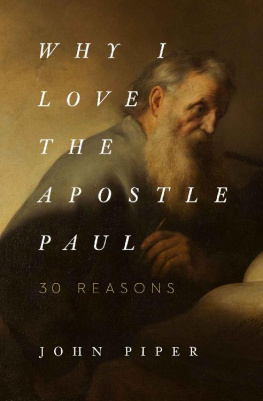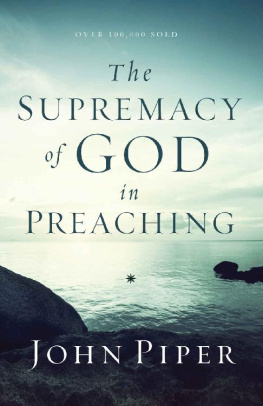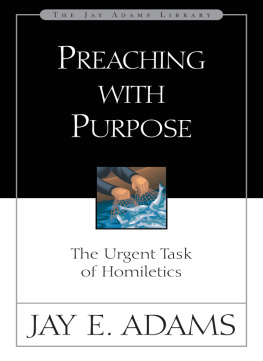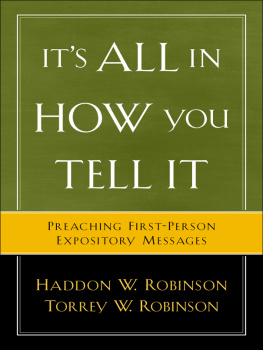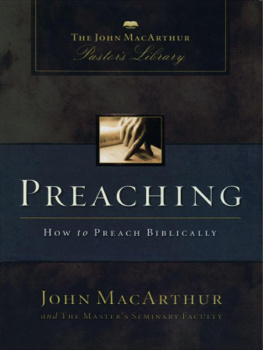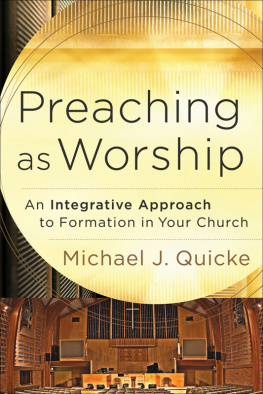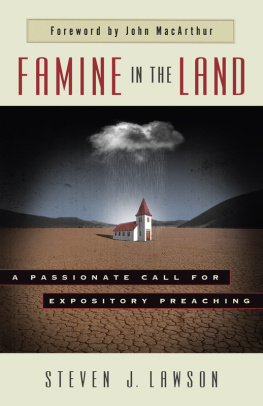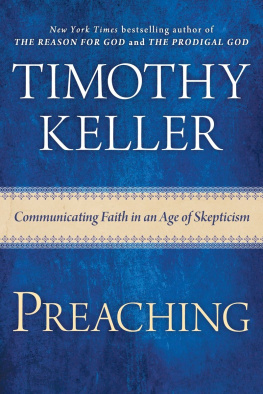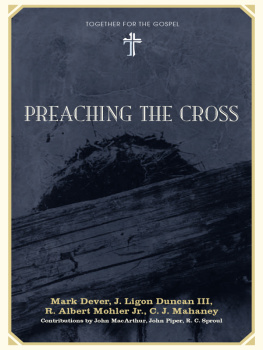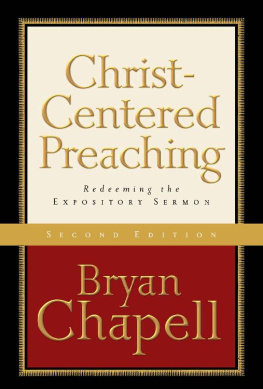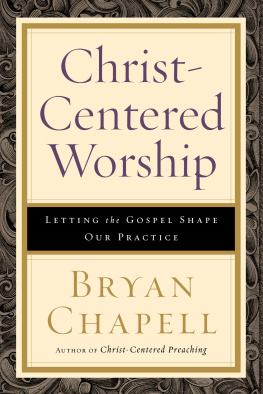Table of Contents
Landmarks
Part 3
How Does Preaching Become a Means of the Miracle of WorshipSupernaturally?
Expository Exultation in the Power of the Holy Spirit
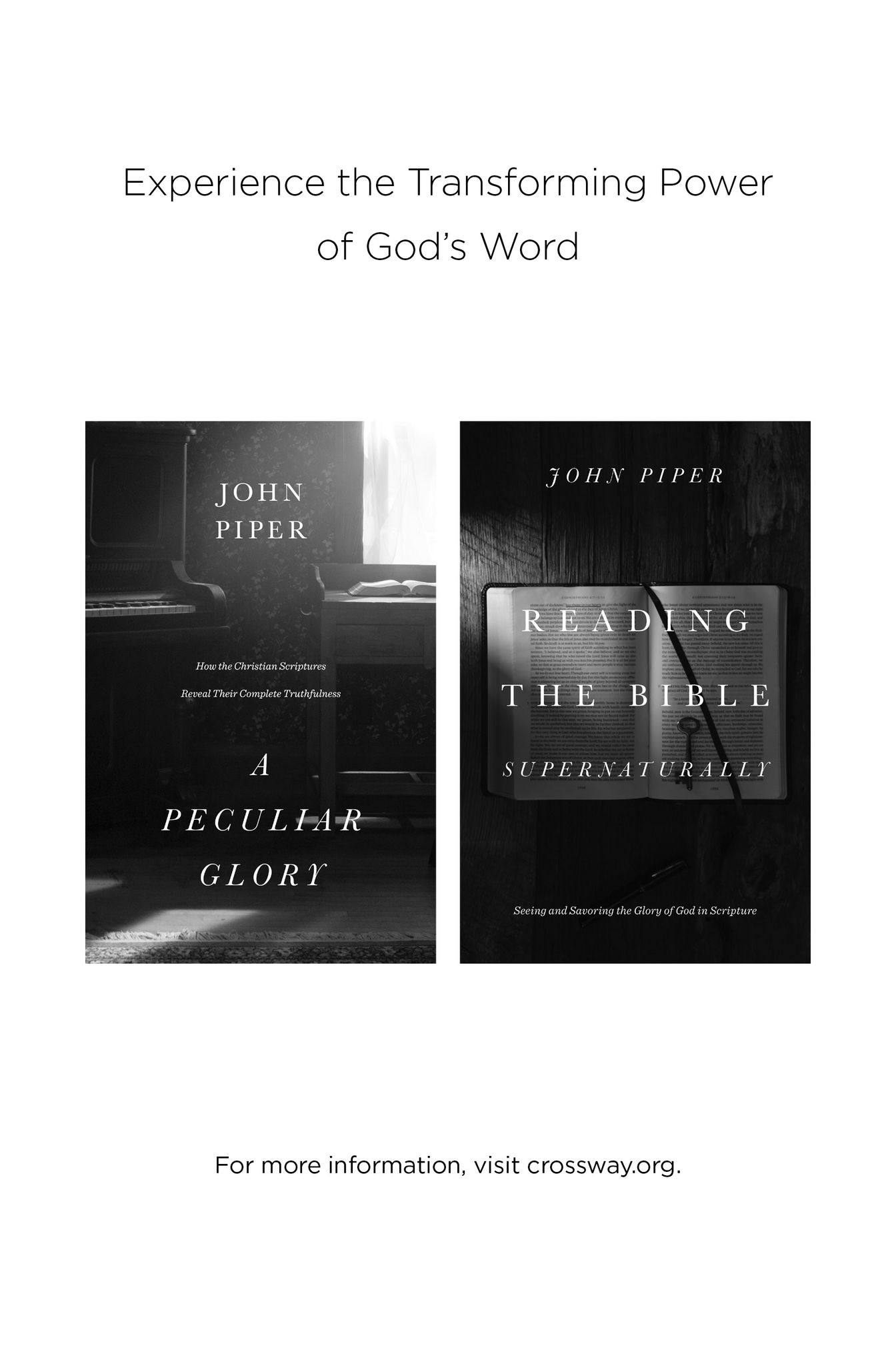
The Perils of Christian Eloquence
In part 4 I am focusing on the preachers use of his natural powers in the effort to answer the question, How does preaching become a means of the miracle of worship? In the previous chapter, I argued that right thinking, clear logic, and the valid use of reason in preaching are essential to loving people well and humbly honoring the authority of Scripture. In this chapter, I move from the natural powers of thinking to the natural powers of writing and speaking. Should we use our natural powers in choosing words, with a view to making them as compelling as we can? Should we try to be eloquent?
Not with Words of Eloquent Wisdom
Should we even talk about eloquence in Christian preaching? The question is urgent first and foremost because the apostle Paul, writing under the inspiration of the Holy Spirit, says in 1 Corinthians 1:17, Christ did not send me to baptize but to preach the gospel, and not with words of eloquent wisdom , lest the cross of Christ be emptied of its power. Christ sent Paul to preach, not with eloquence, lest the cross of Christ be gutted. That makes this an urgent issue.
Even if we cite other translations, the problem remainsthe NIV (not with wisdom and eloquence), or the NASB (not in cleverness of speech), or the KJV (not with wisdom of words). There is a way to preacha way of eloquence or cleverness or human wisdomthat nullifies the cross. We should dread nullifying the cross. We need to know what this eloquence -cleverness- wisdom of words isand avoid it.
Consider a similar statement from Paul in 1 Corinthians 2:1: I, when I came to you, brothers, did not come proclaiming to you the testimony of God with lofty speech or wisdom . Or the NIV: I did not come with eloquence or human wisdom . Or the NASB: I did not come with superiority of speech or of wisdom . Or the KJV: [I] came not with excellency of speech or of wisdom.
These passages are ominous for preachers. Most of us try to choose words and say them in a way that will have greatest impact. Should we? Should I choose words, or ways of putting words together, or ways of delivering them, with a view to increasing their life -giving, pride -humbling, God -exalting, Christ -magnifying, joy -intensifying, love -awakening, missions -mobilizing, justice - advancing impact? Am I usurping the role of the cross and the Spirit when I do that? Is Paul saying that the pursuit of impact on others through word selection, word arrangement, and word delivery preempts Christs power and belittles the glory of the cross?
Is the Bible Eloquent?
Complicating the question is this: most Bible scholars throughout history have drawn attention to the fact that the Bible itself has many eloquent parts.
In other words, the Bible contains eloquent language, and some of its impact on readers is owing in some way to that eloquence.
Spirit - Led Eloquence?
So, Luther says, the Holy Spirit himself leads us at times to a kind of eloquenceeven in prayer.
If these observations of Calvin, Luther, and Donne are right, what did Paul mean when he said he renounced eloquence for the sake of the cross? Are Calvin and Luther and Donne missing something?
Eloquence of George Whitefield
Another way to feel the problem is to compare what was said about two giants of the First Great Awakening, George Whitefield and Jonathan Edwards. These two preachers were deeply unified theologically and significantly different in the way they preached.
In the spring of 1740, George Whitefield was in Philadelphia preaching outdoors to thousands of people. Benjamin Franklin attended most of these messages. Franklin, who did not believe what Whitefield was preaching, commented on these perfected sermons:
His delivery... was so improved by frequent repetition, that every accent, every emphasis, every modulation of voice, was so perfectly well turned, and well placed, that without being interested in the subject, one could not help being pleased with the discourse : a pleasure of much the same kind with that received from an excellent piece of music.
Here is preaching that is so eloquent you can like it without believing anything in it. That should make a preacher tremble. Whitefields eloquence was pleasurable to Benjamin Franklin, who cared nothing for what Whitefield was trying to get across. Franklin loved Whitefields eloquence and rejected his Savior. Was Whitefield emptying the cross of its power?
Eloquence in Our Day
But be careful. Some younger preachers may read this and think they are not bedeviled by this issue because they dont care about Whitefields kind of eloquence. They have abandoned oratory the same way they abandoned coat and tie. Beware. Its not that simple. There is a kind of eloquence that consists not in traditional fluency of words but in the eloquence of hip and dress and slang and savvy and casual and the appearance of artlessness that can have the exact same mesmerizing effect in our day that Whitefields eloquence had in his. People may love this contemporary, careless eloquence even if they care nothing for the truths the preacher is trying to get across. In other words, none of us escapes the urgency of this question. We all need an answer.
Eloquence of Jonathan Edwards
Jonathan Edwards, Whitefields contemporary and friend, was very different. Edwards did not receive accolades for dramatic eloquence. But he did have another kind of eloquence. One eyewitness answered the question of whether Edwards was an eloquent preacher:
If you mean, by eloquence, what is usually intended by it in our cities; he had no pretensions to it. He had no studied varieties of the voice. And no strong emphasis. He scarcely gestured, or even moved; and he made no attempt, by the elegance of his style, or the beauty of his pictures, to gratify the taste, and fascinate the imagination. But, if you mean by eloquence, the power of presenting an important truth before an audience, with overwhelming weight of argument. And with such intenseness of feeling, that the whole soul of the speaker is thrown into every part of the conception and delivery; so that the solemn attention of the whole audience is riveted, from the beginning to the close, and impressions are left that cannot be effaced; Mr. Edwards was the most eloquent man I ever heard speak.
In either caseWhitefield, the dramatic orator, or Edwards, the motionless intense logicianthe question remains: Were these forms of eloquence an emptying of the cross of Christ? Were they following Pauls example when he said that he preached the gospel not with words of eloquent wisdom, lest the cross of Christ be emptied of its power?
Denneys Haunting Statement
James Denney (18561917), Scottish theologian and preacher, made a statement that haunts me as a preacher. Whether we are talking about the more highbrow eloquence of oratory or the more lowbrow, laidback, cool eloquence of anti -oratory, Denneys statement cuts through to the ultimate issue. He said, No man can give the impression that he himself is clever and that Christ is mighty to save. This has been one of the most influential sentences I have ever read regarding how to preach. Does this mean that any conscious craft or art in writing or speaking elevates self and obscures the truth that Christ is mighty to save?
Eloquence as an End in Itself?
In 2008, Denis Donoghue, professor of English and American letters at New York University, published On Eloquence. His contention is probably a modern expression of the kind of thing Paul was dealing with in Corinth. He argues that eloquence is a surprising, impacting style that is an end in itself. He says, for example:

